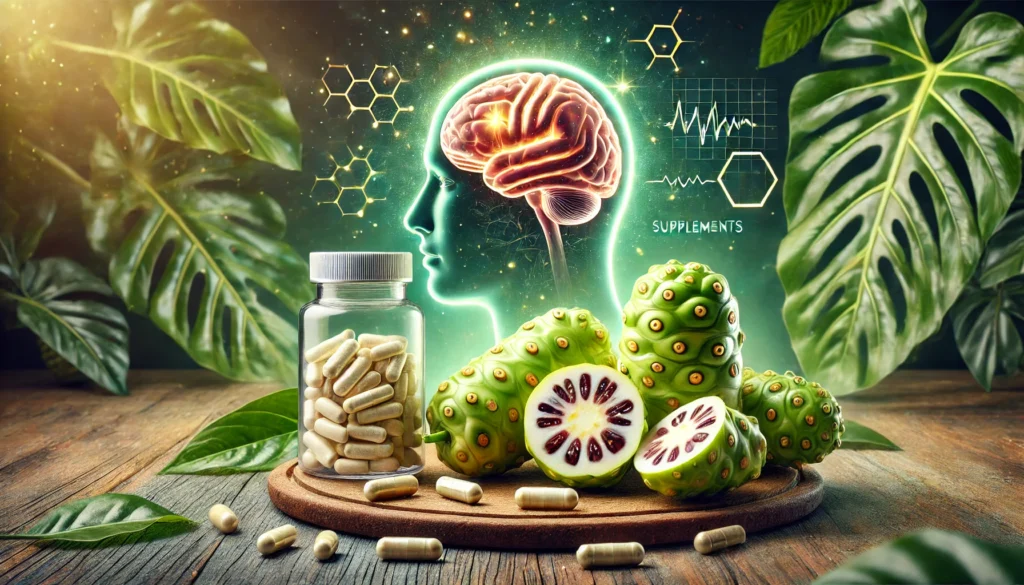Noni, a tropical fruit scientifically known as Morinda citrifolia, is traditionally used in Polynesian and Southeast Asian cultures for its wide-ranging health benefits. In recent years, noni has gained attention as a potential nootropic, thanks to its antioxidant properties, support for cellular health, and possible impact on cognitive function. This article delves into the scientific basis for noni’s use as a supplement, exploring its active ingredients, effects on brain health, dosage guidelines, potential side effects, interactions with other supplements and medications, and additional considerations for safe use.
You May Also Like:
Camu Camu: Benefits, Dosage, Side Effects, Drug Interactions, and Other Important Information
Sources and Chemistry of Noni
Noni grows in tropical and subtropical regions, with primary origins in Southeast Asia and Polynesia. The fruit, leaves, and roots are used in traditional medicine and modern extracts alike, with noni juice being a popular product marketed for its health-promoting properties.
Noni is composed of a complex array of phytochemicals, including anthraquinones, flavonoids, terpenoids, and unique alkaloids like damnacanthal and scopoletin. These compounds exhibit antioxidant, anti-inflammatory, and immunomodulatory activities. Among the most studied components are:
- Damnacanthal: A quinone compound that interacts with cell signaling pathways, impacting cellular health and potentially exerting neuroprotective effects.
- Scopoletin: A coumarin derivative with antioxidant properties, contributing to noni’s role in modulating oxidative stress within the brain.
- Polysaccharides: Found in noni juice, these compounds support immune function, which indirectly benefits brain health by maintaining a balanced inflammatory response.
Each of these compounds influences brain and body physiology through different mechanisms, collectively contributing to noni’s potential as a nootropic supplement.

Physiological Mechanisms of Noni in the Body and Brain
The active compounds in noni exert their effects through antioxidant, anti-inflammatory, and immunomodulatory pathways, each of which plays a role in brain health. High oxidative stress and inflammation are common contributors to cognitive decline and neurodegenerative diseases. Noni’s phytochemicals work to counteract these processes, promoting a healthier brain environment.
Oxidative Stress and Antioxidant Support
The brain is highly susceptible to oxidative stress due to its high oxygen consumption and lipid-rich composition. Noni’s antioxidant properties, attributed primarily to scopoletin and flavonoids, help neutralize free radicals, protecting neurons from oxidative damage. This protective effect supports cognitive resilience and may slow age-related cognitive decline.
Anti-Inflammatory Effects
Chronic inflammation in the brain is linked to various neurological conditions, including Alzheimer’s disease and mood disorders. Noni’s flavonoids and polysaccharides exhibit anti-inflammatory effects, modulating cytokine production and promoting a balanced immune response. By reducing inflammation, noni could potentially improve mental clarity, focus, and mood stability.
Support for Cellular Health
Compounds like damnacanthal interact with cellular signaling pathways involved in gene expression and cellular repair. This interaction may provide neuroprotective benefits, supporting neuron integrity and resilience. Noni’s effects on cellular health are particularly relevant for individuals facing high levels of mental stress, which can accelerate cellular wear and contribute to cognitive decline.

Potential Nootropic Benefits of Noni
While noni is primarily known for its antioxidant and anti-inflammatory properties, emerging research suggests that these actions can support brain health and cognitive function, positioning noni as a nootropic with unique benefits. Some of the potential cognitive benefits of noni include:
- Cognitive Clarity and Focus: By supporting cellular health and reducing oxidative stress, noni may enhance mental clarity and focus. This benefit is especially valuable for individuals under high cognitive demands or experiencing brain fog. The increased blood flow to the brain, facilitated by noni’s active compounds, may further aid in sustaining focus over extended periods.
- Mood Regulation and Stress Reduction: Scopoletin and other noni phytochemicals may interact with neurotransmitter pathways that influence mood and stress responses. Though not a replacement for mood disorder treatments, noni may help stabilize mood and reduce stress-related cognitive impairment. Its adaptogenic properties also make it potentially beneficial in mitigating the effects of chronic stress, which can impact cognitive health.
- Neuroprotection: Noni’s combination of antioxidants and anti-inflammatory compounds may help protect neurons from environmental stressors and age-related decline. This neuroprotective effect may reduce the risk of neurodegenerative conditions and support long-term cognitive health. By preventing damage from free radicals, noni could help slow cognitive aging and enhance resilience against neurodegenerative diseases.

Dosage and Supplementation Guidelines
Noni is available in several forms, including capsules, powders, and juices. Dosage recommendations for nootropic purposes are not yet standardized, as more research is required to determine optimal intake levels for cognitive benefits.
- General Supplementation Dosage: For general health purposes, a typical dosage of noni juice ranges from 30 to 90 mL daily. When taking capsules, most manufacturers recommend a dose between 500 mg and 1,500 mg per day. Given the potential variability in individual response, beginning with a lower dose and gradually increasing it to a level that provides cognitive benefits is advisable.
- Therapeutic Nootropic Dosage: Higher doses (1,000 mg to 2,000 mg of dried noni fruit extract) have been explored for their potential health benefits. However, further research is required to establish a clinically recommended dosage specifically for noni’s nootropic benefits.
- Supplement Form Selection: Noni is available in both juice and encapsulated forms. While juice is readily absorbed, capsules may offer a more controlled intake of active compounds, particularly for individuals interested in noni’s nootropic effects.
It is important to consult with a healthcare provider before starting noni supplementation, especially for individuals taking other supplements or medications, as discussed below.
Side Effects and Safety
Noni is generally considered safe for most individuals when used at recommended doses. However, there are some side effects and safety considerations to be aware of:
- Gastrointestinal Disturbances: Noni may cause mild digestive issues, including nausea and diarrhea, particularly at higher doses.
- Hepatotoxicity Risk: Some studies have raised concerns about noni’s potential hepatotoxicity due to its anthraquinone content. Individuals with liver conditions should exercise caution and limit noni intake to avoid exacerbating liver stress.
- Hyperkalemia Risk: Noni contains significant levels of potassium, which can lead to hyperkalemia (high blood potassium levels) in susceptible individuals. This is especially relevant for those with kidney conditions or individuals taking potassium-sparing medications.

Interactions with Other Supplements and Medications
Noni may interact with certain medications and supplements, making it crucial for users to be aware of potential interactions that could impact health and safety.
- Blood Pressure and Antihypertensive Medications: Noni may lower blood pressure, potentially enhancing the effects of antihypertensive drugs. Individuals on blood pressure medication should monitor their levels closely and consult their healthcare provider to avoid hypotension.
- Potassium-Retaining Drugs: Given its high potassium content, noni may increase blood potassium levels, particularly in individuals taking potassium-sparing diuretics, ACE inhibitors, or angiotensin II receptor blockers. Monitoring potassium intake is essential to avoid hyperkalemia.
- Anticoagulant Medications: Noni’s active compounds can influence blood coagulation pathways. Although not a potent anticoagulant, it is advisable for individuals on blood-thinning medications to consult with their healthcare provider before using noni supplements.
- Interactions with Other Nootropics: When combined with other nootropic supplements, noni may enhance cognitive support. However, excessive combinations of antioxidants should be approached with caution, as an overabundance of antioxidants may inhibit beneficial reactive oxygen species involved in cellular signaling.
Risks for Individuals with Certain Health Conditions
While noni may offer cognitive benefits for some, it carries risks for individuals with specific health conditions. Those with liver or kidney conditions, in particular, should use noni cautiously.
- Liver Disease: Individuals with liver disease or liver enzyme abnormalities may experience worsened symptoms from noni supplementation due to the presence of anthraquinones, which could contribute to hepatotoxicity. Monitoring liver function is recommended for any user with a history of liver problems.
- Kidney Disease: Due to noni’s high potassium content, individuals with impaired kidney function should avoid noni supplements, as their kidneys may struggle to excrete excess potassium effectively, risking hyperkalemia.
- Pregnancy and Breastfeeding: Limited evidence exists on the safety of noni supplementation during pregnancy and breastfeeding. It is generally advised to avoid noni during these periods unless specifically recommended by a healthcare provider.
Conclusion: Should You Consider Noni as a Nootropic?
Noni’s unique blend of phytochemicals positions it as an intriguing candidate for cognitive support. Its antioxidant, anti-inflammatory, and cell-supportive properties offer promising benefits for brain health, particularly for individuals interested in enhancing mental clarity, reducing stress, and protecting against age-related cognitive decline. However, while preliminary research is promising, more studies are necessary to substantiate noni’s nootropic effects and to establish safe, effective dosing guidelines for cognitive benefits.
Noni supplementation can offer benefits, but as with any supplement, it is essential to consider personal health conditions, potential interactions, and individual responses. Consulting a healthcare provider before beginning noni supplementation is recommended, especially for individuals with existing health concerns or those taking medications. With these considerations in mind, noni may serve as a valuable addition to a balanced cognitive health regimen, supporting mental clarity, resilience, and overall brain health.

References:
- Immunomodulation contributes to the anticancer activity of morinda citrifolia (noni) fruit juice. Retrieved from: https://pubmed.ncbi.nlm.nih.gov/8895953/
- Analgesic and antiinflammatory activity of Morinda citrifolia L. (Noni) fruit. Retrieved from: https://pubmed.ncbi.nlm.nih.gov/19548275/
- Anti-inflammatory and potential cancer chemopreventive constituents of the fruits of Morinda citrifolia (Noni). Retrieved from: https://pubmed.ncbi.nlm.nih.gov/17480098/
- What is noni juice, and is it beneficial? Retrieved from: https://www.medicalnewstoday.com/articles/noni-juice
- Noni leaf and black tea enhance bone regeneration in estrogen-deficient rats. Retrieved from: https://www.medicalnewstoday.com/articles/noni-juice
Important Note: The information contained in this article is for general informational purposes only, and should not be construed as health or medical advice, nor is it intended to diagnose, prevent, treat, or cure any disease or health condition. Before embarking on any diet, fitness regimen, or program of nutritional supplementation, it is advisable to consult your healthcare professional in order to determine its safety and probable efficacy in terms of your individual state of health.
Regarding Nutritional Supplements Or Other Non-Prescription Health Products: If any nutritional supplements or other non-prescription health products are mentioned in the foregoing article, any claims or statements made about them have not been evaluated by the U.S. Food and Drug Administration, and such nutritional supplements or other health products are not intended to diagnose, treat, cure, or prevent any disease.


